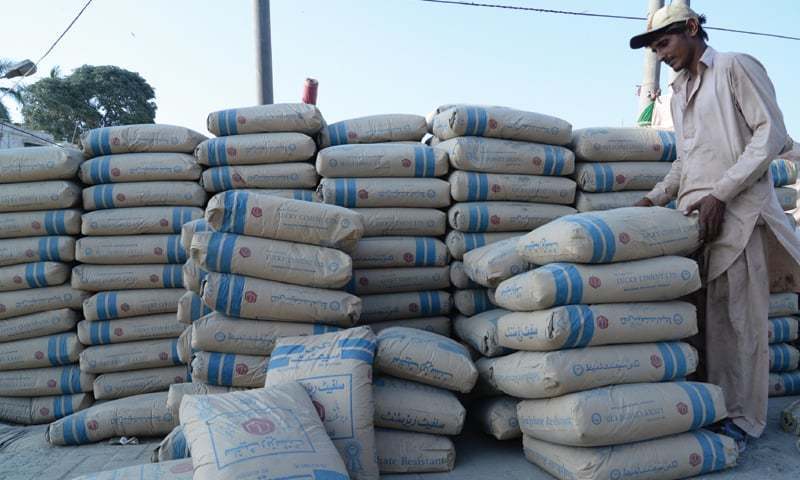APCMA knocks on Finance Minister’s door over Rs18bn tax evasion claim

MG News | October 13, 2024 at 11:54 AM GMT+05:00
October 13, 2024 (MLN): In a bid to address serious allegations of tax evasion worth Rs18 billion, the All Pakistan Cement Manufacturers Association (APCMA) has formally reached out to the Federal Minister for Finance and Revenue Minister Muhammad Aurangzeb.
The association contends that the claim of Rs18bn in evaded sales tax, attributed to excessive input tax adjustments, requires a more nuanced examination.
In their letter, the APCMA requested a meeting with the Finance Minister and relevant officials from the Federal Board of Revenue (FBR) wherein the association will present a comprehensive response to the allegations, emphasizing the operational and financial realities faced by the cement industry.
"It is essential to emphasize that APCMA represents reputable listed companies with a significant public interest mandate, all of which adhere to stringent corporate governance practices," the letter reads.
As such, the cement industry is one of the largest contributors to the national exchequer, consistently paying sales tax, federal excise duties, and various other levies.
"Our sector has always prioritized compliance and transparency, and any allegations suggesting otherwise should be subject to a detailed and fair review," it added.
APCMA further stated that these claims are damaging not only to the reputation of the cement industry but also to the confidence of the professionals and businesses that have long been significant contributors to Pakistan's economic development.
While expressing its concerns, the association also said that the conclusions drawn, particularly in relation to the cement sector, are based on an incomplete and, at times, flawed understanding of the industry's operational complexities.
Cement manufacturing is a capital-intensive and resource-dependent process, with coal being a key raw material. However, coal consumption is influenced by various factors that appear to have been overlooked in the FBR's analysis, the letter added.
The association also highlighted the factors that may impact the production and sale of cement.
Plant age and technological variability
Cement plants differ significantly based on their operational age and the level of technological advancements implemented. Older plants typically rely on outdated technologies, such as long dry kilns, which require more energy and coal per unit of cement produced.
In contrast, modern plants with advanced technologies like pre-calcination and energy recovery systems consume significantly less coal. A one-size-fits-all approach in evaluating coal consumption overlooks these important technological disparities.
Geographic and logistical considerations
Cement plants located far from coal mines or seaports incur higher transportation costs, not just in monetary terms but also in terms of coal quality degradation during long-distance transportation.
Additionally, plants located in hilly or remote regions face higher energy consumption due to the additional effort required to transport raw materials and finished products over long and difficult routes. Cement prices (like most commodities) vary across the country and within markets and are determined by competitive pressure and demand and supply dynamics.
They may not necessarily be directly linked to a specific plant's cost structure. The FBR analysis fails to account for these geographic variations in logistical costs and coal consumption.
Impact of power generation and cogeneration plants
Many cement plants generate their electricity using captive power plants that run on coal, which directly affects their overall coal consumption.
These power generation needs are often dictated by unreliable grid supplies or high electricity tariffs, especially in regions where industrial power availability is limited.
By omitting this crucial factor, the analysis fails to differentiate between coal used for cement production and coal consumed for energy generation, leading to distorted input-output calculations.
Inventory management and seasonal demand variability
Cement manufacturers often bulk-purchase coal when prices are favorable, and stockpile it as part of their inventory management strategy.
Additionally, cement production and sales are subject to seasonal demand fluctuations, such as a slowdown during the monsoon season. This means that coal purchases may not correlate with immediate production, leading to higher input tax claims in certain months, which are balanced out over time.
These operational realities are completely missing from the FBR's assessment.
Variable coal quality and energy efficiency
The quality of coal available to the cement industry fluctuates significantly depending on the source-imported or domestic.
Higher-quality coal contains more carbon, leading to greater energy yield per unit, while lower-quality coal (with higher ash or moisture content) results in inefficient combustion, requiring more coal to produce the same energy output.
This variation in coal quality has a direct impact on consumption patterns but appears to have been ignored in the analysis, oversimplifying the conclusions.
Maintenance shutdowns and efficiency losses
Cement plants regularly undergo maintenance shutdowns to repair equipment, including kilns, which temporarily reduce production capacity and operational efficiency.
During these periods, coal consumption may not reflect actual cement output. Without factoring in planned and unplanned maintenance, the analysis risks presenting a misleading picture of operational efficiency and tax compliance.
"The analysis shared by the FBR overlooks these key elements and risks creating the erroneous impression that legitimate business practices are fraudulent," the association said.
"We are particularly concerned by the assertion that a higher coal cost automatically indicates tax fraud, which simplifies a much more complex operational reality," it further added.
The association believes that any genuine concerns can be addressed through meaningful dialogue and a comprehensive review process.
Thus, it requested a meeting with the Finance Minister's office and relevant officials from the FBR to present a detailed response to the allegations and to clarify the operational and financial realities of the cement industry.
APCMA is hopeful that this matter will be handled with due care, ensuring that legitimate businesses are not unjustly penalized and that professionals across the sector are not dissuaded by an environment of unnecessary scrutiny.
Copyright Mettis Link News
Related News
| Name | Price/Vol | %Chg/NChg |
|---|---|---|
| KSE100 | 134,299.77 290.06M |
0.39% 517.42 |
| ALLSHR | 84,018.16 764.12M |
0.48% 402.35 |
| KSE30 | 40,814.29 132.59M |
0.33% 132.52 |
| KMI30 | 192,589.16 116.24M |
0.49% 948.28 |
| KMIALLSHR | 56,072.25 387.69M |
0.32% 180.74 |
| BKTi | 36,971.75 19.46M |
-0.05% -16.94 |
| OGTi | 28,240.28 6.19M |
0.21% 58.78 |
| Symbol | Bid/Ask | High/Low |
|---|
| Name | Last | High/Low | Chg/%Chg |
|---|---|---|---|
| BITCOIN FUTURES | 118,140.00 | 119,450.00 115,635.00 |
4270.00 3.75% |
| BRENT CRUDE | 70.63 | 70.71 68.55 |
1.99 2.90% |
| RICHARDS BAY COAL MONTHLY | 97.50 | 0.00 0.00 |
1.10 1.14% |
| ROTTERDAM COAL MONTHLY | 108.75 | 108.75 108.75 |
0.40 0.37% |
| USD RBD PALM OLEIN | 998.50 | 998.50 998.50 |
0.00 0.00% |
| CRUDE OIL - WTI | 68.75 | 68.77 66.50 |
2.18 3.27% |
| SUGAR #11 WORLD | 16.56 | 16.60 16.20 |
0.30 1.85% |
Chart of the Day
Latest News
Top 5 things to watch in this week
Pakistan Stock Movers
| Name | Last | Chg/%Chg |
|---|
| Name | Last | Chg/%Chg |
|---|




 MTB Auction
MTB Auction